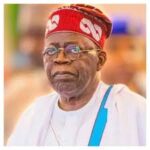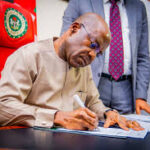Former Secretary to the Government of the Federation and ex-Minister of Finance, HRM Oluyemi Falae, CFR, has defended his role in Nigeria’s controversial Structural Adjustment Programme (SAP), describing it as a necessary response to the country’s mounting debt crisis in the 1980s.
Speaking in an interview on Thursday, Falae refuted claims that the policy, which involved currency devaluation and liberal economic reforms, was implemented with malicious intent. He insisted that Nigeria was left with no viable alternatives due to crushing external debt and looming isolation from global trade.
“We were in debt. We had no choice but to pay the debt back. And we could not impose our solution on the international community. So they had us by the throat,” he said. “If we did not do a deal with the creditors, we would stop trading internationally. Nigeria would be in crisis. So it was not a pleasant thing. It was the least bad of all the bad options available.”
Falae also clarified that he was not the originator of SAP, noting that the framework had already been adopted by the Ibrahim Babangida administration before his appointment.
“I was appointed Secretary to the Federal Government on January 29, 1986. Six weeks earlier, Babangida had already announced the adoption of a domestic structural adjustment programme. That policy was already government policy by the time I was appointed. I did not bring the policy, I did not recommend it, I did not make it,” he stated.
He attributed the economic crisis that necessitated SAP to what he described as fiscal mismanagement under the Shehu Shagari administration, particularly in the allocation of import licenses.
“People forget that it was President Shagari who plunged Nigeria into economic crisis by issuing import licenses far exceeding our foreign exchange earnings. By the time Buhari took over, Nigeria was owing trade arrears of nearly $30 billion,” Falae explained.
Addressing criticism over the long-term impacts of SAP, including currency devaluation and economic hardship, Falae defended the exchange rate performance during his tenure.
“By the time I left government in 1990, the exchange rate was 5.50 naira to the dollar after three years of SAP. It was after that we began to see 32, 48, and 100 naira to the dollar,” he said. “For the time that I was there implementing the programme, the rate never exceeded 5.50.”
While acknowledging public discontent, Falae highlighted some benefits of the policy, including reforms to the marketing board system and the introduction of domiciliary accounts.
“One of the positives was the reform of the marketing policy system, which was very good for farmers. Also, the introduction of domiciliary accounts—which I believe now hold balances of about $35 billion in Nigeria.”
On comparisons between SAP and present-day economic reforms under the Tinubu administration, including forex liberalization and fuel subsidy removal, Falae emphasized the need for a balanced approach.
“Our problem has been abuse,” he said. “You can never surrender the economy to blind market forces, and at the same time, you cannot exclude them entirely. You need a balance between government intervention and the operation of market forces. That is the path of wisdom.”
Falae reiterated that while SAP was an imperfect solution, it was the most feasible option at a time of national economic emergency.
Nzubechukwu Eze









